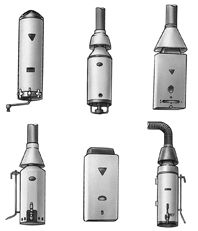Gas water heaters
Gas water heaters that have not been properly maintained can cause deaths and serious injuries. If you have a gas bath heater or flued instantaneous water heater in your bathroom or in your kitchen like any of the appliances shown here (see diagram) it could be dangerous. The following advice applies to both natural gas and LPG water heaters.
Flued water heaters
Flued water heaters, using natural or LPG gas, can be found in bathrooms. They were designed to operate with a flue that vent harmful fumes outside – just like a chimney. If the flue pipe leaks or becomes blocked problems can occur.
Bathrooms are particularly tough on water heaters. The moist environment speeds up corrosion, which can cause leaks. Lint, hair, fluff from towels, talcum powder, shampoo and aerosol residue can accumulate within the heater. This can block the airflow needed for the gas burner to operate safely.

Flueless water heaters
Balanced flued water heaters, also using natural or LPG gas, are designed to work without a flue pipe but they still need permanent unobstructed ventilation to operate safely.
If you’re not sure about the type of water heater you have in your home, contact the manufacturer or the NSW Master Plumbers Association on 1800 424 181 (toll free) or the manufacturer.
The potential risk
If ventilation is obstructed in either a flued or flueless water heater, poisonous fumes like carbon monoxide can be forced back into the room contaminating the air you breathe. As carbon monoxide is colourless, odourless and tasteless, you won’t know it’s there. If you’re renting your home, it’s important to bring this safety message to the attention of the:
- property owner, who is responsible for gas appliance safety, or
- real estate agent.
Reducing the risk
One way to reduce the risk is to replace the heater with a new, safer and more energy efficient heater, located outside the building. If you decide to do this, use a licenced gasfitter to carry out the work and make sure your water heater (indoor or outdoor) is serviced once a year.
Important safety tips
Here are some important safety tips to remember:
- Make sure your water heater is serviced once a year by a licensed gasfitter.
- Keep a written report of any maintenance work undertaken and be sure you receive a Certificate of Compliance from a licensed gasfitter.
- Make sure your bathroom and kitchen heaters have unobstructed ventilation.
- Look out for any signs of discolouration of the water heater or the walls near the heater, as this can indicate dangerous problems with the heater or its flue.
- Make sure heater flue pipes are free from all restrictions and holes.
- Make sure that all new and replacement gas water heaters are installed outside the building.
Making a complaint
When making a complaint, you should include:
- details of the issues you are experiencing
- copies of any correspondence that shows how you have tried to resolve the matter.
How NSW Fair Trading will handle your complaint
Your complaint will be reviewed to determine the most appropriate resolution. This may include:
- providing you with information to help resolve your complaint
- recording the complaint issues to assist in future compliance programs, or
- contacting the other party to try and resolve the dispute.
You can lodge a complaint:
Online
If you cannot resolve your matter, submit your complaint by using our form.
By mail
Post your complaint form and documentation to:
NSW Fair Trading
PO Box 972
Parramatta NSW 2124
Ask a question
If you are unable to find the information you need, you can call us between 8:30am to 5pm on Monday to Friday. You can also use our form to make an enquiry.